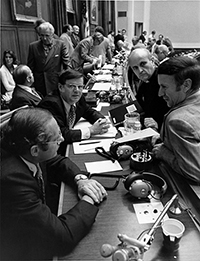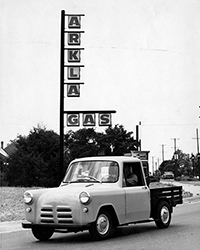FAYETTEVILLE, Ark. — University of Arkansas Libraries announce the opening of the Ray Thornton Papers (Manuscript Collection 1964).
As a native Arkansan, longtime congressman, and former University of Arkansas president, Thornton’s papers are a significant contribution to Special Collection’s extensive holdings of archival materials relating to twentieth-century political history, University history, and the history of Arkansas.
Ray Thornton’s career spans over 40 years of public service and his papers document his distinguished political career. Historical materials detail Thornton’s time as a member of the House Judiciary Committee, when Thornton served on a special six-person committee investigating Watergate. In July 1974, members of the special committee drafted articles of impeachment against President Richard M. Nixon. Thornton proposed articles charging the president with obstruction of justice, abuse of power, and contempt of Congress, which were subsequently incorporated into the full Judiciary Committee’s articles of impeachment, ultimately leading to Nixon’s resignation that August.
 Other Watergate materials include opinion correspondence from Arkansas constituents and out-of-state correspondents, published records of the Committee on the Judiciary’s impeachment inquiry, President Nixon’s reelection campaign activities in 1972, transcripts of Watergate-related presidential tapes, and investigative background materials.
Other Watergate materials include opinion correspondence from Arkansas constituents and out-of-state correspondents, published records of the Committee on the Judiciary’s impeachment inquiry, President Nixon’s reelection campaign activities in 1972, transcripts of Watergate-related presidential tapes, and investigative background materials.
Political researchers will also find items related to Thornton’s tenure as chair of the American Association for the Advancement of Science’s Committee on Science, Engineering, and Public Policy (1980-1984), and as chair of the National Institutes of Health Recombinant DNA Advisory Committee (1980-1983).
With this donation, more of the rich legacy of Arkansas’ Congressional delegation is preserved in Special Collections, the largest academic archive in the state. The collection complements the papers of Thornton’s contemporaries also held in Special Collections, including Rep. John Paul Hammerschmidt, and Sens. Dale Bumpers and David Pryor.
Arkansas Native Devotes Career to Home State
Raymond Hoyt “Ray” Thornton Jr. was born in Conway in 1928 and grew up in Sheridan. He graduated high school at 16 and attended the University of Arkansas. After two years, he was awarded the Navy Holloway Program Scholarship to attend Yale University. He graduated from Yale with a Bachelor of Arts degree in international relations in 1950. Thornton attended the University of Texas Law School for a time before serving three years in the United States Navy with the Pacific Fleet.
 Following his service, Thornton returned to Arkansas and enrolled in the University of Arkansas School of Law and served as president of student government. He married Betty Jo Mann of Sheridan in 1956. Thornton completed his degree and was admitted to the Arkansas Bar Association later that year. He practiced corporate law for 14 years, and was elected attorney general of Arkansas in 1970 where he served one term. During the 1960s, Thornton, along with Ed Handy, designed a lightweight vehicle to be used by Arkansas Louisiana Gas Company (Arkla). Although there was interest in mass producing the car, production costs sidelined the project.
Following his service, Thornton returned to Arkansas and enrolled in the University of Arkansas School of Law and served as president of student government. He married Betty Jo Mann of Sheridan in 1956. Thornton completed his degree and was admitted to the Arkansas Bar Association later that year. He practiced corporate law for 14 years, and was elected attorney general of Arkansas in 1970 where he served one term. During the 1960s, Thornton, along with Ed Handy, designed a lightweight vehicle to be used by Arkansas Louisiana Gas Company (Arkla). Although there was interest in mass producing the car, production costs sidelined the project.
After serving in Washington as a Democratic representative of Arkansas’ 4th Congressional District from 1973 to 1979, Thornton returned to Arkansas to serve as executive director of the Joint Educational Consortium of Ouachita Baptist University and Henderson State University. He then served as president of Arkansas State University from 1980 to 1984 and served as president of the University of Arkansas System beginning in 1984.
His accomplishments as president of the University of Arkansas System included raising $50 million for various building projects, most notably the historic renovation of Old Main, along with then-Chancellor Dan Ferritor, and the construction of the Bell Engineering Building on the Fayetteville campus. While at the U of A, Thornton orchestrated removal of the president’s office from the Fayetteville campus to a separate administrative unit in Little Rock. In addition to his duties as president, he served as a distinguished professor of interdisciplinary studies at the J. William Fulbright College of Arts and Sciences.
Thornton left higher education in 1989 to return to politics. He was elected to the U.S. House of Representatives from the 2nd Congressional District in 1990, serving three terms until his successful race for the Arkansas Supreme Court in 1996. He served as a justice for eight years, retiring in 2004. Thornton also served as the first Public Service Fellow at the University of Arkansas at Little Rock William H. Bowen School of Law. In 2009, he was appointed the first chair of the Arkansas Scholarship Lottery and held that position for a year. Thornton and his wife live in Little Rock.
Totaling more than 215 linear feet, the Thornton papers provide scholars and researchers access to rich primary sources documenting an important and expansive period in both national and state history. Professional materials documenting Thornton’s numerous accomplishments are included in the collection, as are a wealth of biographical materials, a rich source of visual materials including paintings and sketches of Thornton, a series of scrapbooks, more than 1,600 photographs, 58 audio cassettes, and more than 100 video cassettes with recordings of Thornton’s speeches and political events.
The Ray Thornton Papers project was completed by Todd Lewis and Vera Ekechukwu with assistance from Christopher Galindo, Cali Rios, Abigail Siedschlag, and Brandon Beasley. Researchers interested in accessing this collection are encouraged to view the finding aid on the Special Collections website.
Researchers should contact the Special Collections department at 479-575-8444, or email specoll@uark.edu, to make arrangements to view the materials, or with questions about any of the materials housed in Special Collections. Special Collections is open to the public 8 a.m. to 5 p.m. Monday-Friday and 10 a.m. to 2 p.m., on Saturdays during the fall and spring school semesters.
About University of Arkansas Libraries: Located at the heart of campus, David W. Mullins Library serves as the main research library on the University of Arkansas campus. Also serving the campus community are the Robert A. and Vivian Young Law Library, the Fine Arts Library, the Physics Library, and the Chemistry and Biochemistry Library. The University Libraries provide access to more than 2 million volumes and 53,000 journals and offer individual and group research help and study spaces; computer labs with printing and scanning; interlibrary loan and RazorRush services; and cultural exhibits and events. The Libraries’ Special Collections Department acquires, preserves, and provides access to materials on Arkansas and the region, its customs and people, and its cultural, physical, and political climate. Visit the Libraries’ web page at libraries.uark.edu to learn more about services and collections.
About the University of Arkansas: The University of Arkansas provides an internationally competitive education for undergraduate and graduate students in more than 200 academic programs. The university contributes new knowledge, economic development, basic and applied research, and creative activity while also providing service to academic and professional disciplines. The Carnegie Foundation classifies the University of Arkansas among only 2 percent of universities in America that have the highest level of research activity. U.S. News & World Report ranks the University of Arkansas among its top American public research universities. Founded in 1871, the University of Arkansas comprises 10 colleges and schools and maintains a low student-to-faculty ratio that promotes personal attention and close mentoring.
Topics
Contacts
Kalli Vimr, public relations coordinator
University Libraries
479-575-7311,
Tim Nutt, Head, Special Collections
University Libraries
479-575-8443,
